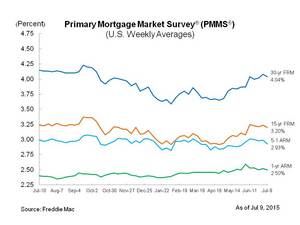 MCLEAN, VA--(Marketwired - Jul 9, 2015) - Freddie Mac (OTCQB: FMCC) today released the results of its Primary Mortgage Market Survey® (PMMS®), showing an investor flight to safety for U.S. Treasuries is pushing average fixed mortgage rates lower and helping to keep buyer activity strong toward the close of the spring homebuying season.
MCLEAN, VA--(Marketwired - Jul 9, 2015) - Freddie Mac (OTCQB: FMCC) today released the results of its Primary Mortgage Market Survey® (PMMS®), showing an investor flight to safety for U.S. Treasuries is pushing average fixed mortgage rates lower and helping to keep buyer activity strong toward the close of the spring homebuying season.
News Facts
- 30-year fixed-rate mortgage (FRM) averaged 4.04 percent with an average 0.6 point for the week ending July 9, 2015, down from last week when it averaged 4.08 percent. A year ago at this time, the 30-year FRM averaged 4.15 percent.
- 15-year FRM this week averaged 3.20 percent with an average 0.5 point, down from last week when it averaged 3.24 percent. A year ago at this time, the 15-year FRM averaged 3.24 percent.
- 5-year Treasury-indexed hybrid adjustable-rate mortgage (ARM) averaged 2.93 percent this week with an average 0.4 point, down from last week when it averaged 2.99 percent. A year ago, the 5-year ARM averaged 2.99 percent.
- 1-year Treasury-indexed ARM averaged 2.50 percent this week with an average 0.3 point, down from last week when it averaged 2.52 percent. At this time last year, the 1-year ARM averaged 2.40 percent.
Average commitment rates should be reported along with average fees and points to reflect the total upfront cost of obtaining the mortgage. Visit the following links for the Regional and National Mortgage Rate Details and Definitions. Borrowers may still pay closing costs which are not included in the survey.
Quote
Attributed to Sean Becketti, chief economist, Freddie Mac.
"Yields on Treasury securities declined this week in response to investor concerns about events in Greece and China. Mortgage rates fell as well, although not by as much as government bond yields. The rate on 30-year fixed-rate mortgages fell 4 basis points to 4.04 percent."
"Overseas volatility is likely to persist for some time, providing some restraint on potential U.S. rate increases. In addition, the minutes pdf of the June meeting of the Federal Open Market Committee suggest the Federal Reserve will proceed cautiously -- monitoring events both overseas and in the U.S. to ascertain the appropriate moment to begin raising short-term interest rates. As a result, mortgage rates may remain in the neighborhood of 4 percent for a while."
Freddie Mac was established by Congress in 1970 to provide liquidity, stability and affordability to the nation's residential mortgage markets. Freddie Mac supports communities across the nation by providing mortgage capital to lenders. Today Freddie Mac is making home possible for one in four home borrowers and is one of the largest sources of financing for multifamily housing. Additional information is available at FreddieMac.com, Twitter @FreddieMac and Freddie Mac's blog FreddieMac.com/blog.
The financial and other information contained in the documents that may be accessed on this page speaks only as of the date of those documents. The information could be out of date and no longer accurate. Freddie Mac does not undertake an obligation, and disclaims any duty, to update any of the information in those documents. Freddie Mac's future performance, including financial performance, is subject to various risks and uncertainties that could cause actual results to differ materially from expectations. The factors that could affect the company's future results are discussed more fully in our reports filed with the SEC.
